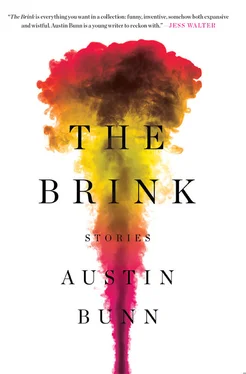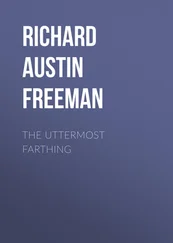“What did you do?” Aaron said, staring into the hole.
Helena looked at him, bitterness etched in her face, Aaron’s face went slack in recognition, and she began to rake the earth into the hole with her hands. Graham dropped the pitchfork and led Em inside, Come with me , where they looked at each other across the kitchen island, both of them shaking, trying not to hear the low voices outside. His daughter’s eyes were imploring, terrified, and he realized he had grown accustomed to not seeing them, not knowing her. Em tucked her hands into the sleeves and he told her to tell him what she knew, what had happened in the basement, and then they would bury the details and, together, never say another word.
The five acres at Five Mile will not be theirs. The market will shit itself again, but they will sell their house and buy another house. Em will go away to college, but she will call regularly, and when she calls, she will ask to speak to her father because, and this he couldn’t have predicted, she will want him to know her. The event of a secret will become a kind of gift. She will tell him about strange boys she meets, about her anxiety, about the place she volunteers. Eventually she will talk about traveling, as her father and mother did once, to ruins in Asia, to the coast of Spain, gathering distance from them and from the dark molecule. And when Em does, Graham will hear his voice, across the years, saying, Go, go, go .
Mother, I have seen such marvels. Like the ocean aglow at night with a cold green fire and a fish with a child’s face and two fleshy whiskers. (No man would eat it. We blessed the creature and tossed it back.) I’ve seen a corpse with golden hair in a boat set adrift; his eyes were the slits on a newly born kitten. When the boatswain came to after three days on the garrucha for the crime of sodomy — his wrists tied behind him and hoisted above the deck so that his arms tore and jellied — he asked, “Am I dead?” and soon he was. I looked to Diego, who dropped his dark eyes in shame, and I saw that too. Three hundred leagues into the sea, we came upon a floating meadow, crabs and petrels tinkering along its dank branches and fronds. A palm tree had taken root there and I imagined, briefly, the coastline of Seville, of home.
But none of these compare to you, Mother, suddenly here, at the gunwale of this ship, soaking wet. Your hands are folded across your chest and you stare away, at the ledge. You look precisely as I left you, your long black hair damp and loose against your back and your bare feet white as salt. Around me, the crew and the others race to trim the Elena ’s sails in a westerly. The captain is missing and I am full of questions. Are you a dream? Is this a fever or worse? I’m afraid to speak. And so I sit alone with my ledger, in the shade of the quarterdeck, and write.
The great Venetian saw the court of the Kublai Khan and wrote his Book of Marvels . I remember how I loved it as a young man, how I stole into the college to read the manuscript and teach myself the words. It took me a year to finish it, and when I was done, I started over again. At night, I dreamed of trader Polo’s adventures: the falcons of Karmania, the gold and silver tower of Mien, and the festival of wives. Marco Polo told his story from a Genoese jail. The Elena is now my prison. His stories saved his life. Perhaps so will mine.
This record began three days ago, on the Elena ’s twenty-second day at sea. We sailed in search of the sea path to India, driving a slant from the Canaries to the Azores into the blue-black unknown. For days, we had been mired in a meadow of sargassum. Captain Veragua, convinced it was the grass of a submarine ridge, ordered the crew to sound the waters on every watch. But the bulb of lead, at the end of the fathom-long cordage, could not sink through the dense thicket. In boredom, the English conscript used a crossbow to hunt a petrel, resting on the carpet of weed, and his arrow succeeded only in punching it down into oblivion. But on Sunday, the meadow miraculously began to break into patches and then lacy fingers. As it trailed into our wake, the crew sang psalms and “Salve Regina” with renewed (if not exactly pleasing) vigor.
Summoned by our good feeling, a group of dolphins assembled beneath the Elena and moved together like a shadow, fracturing and collecting with astounding speed. They teased us, the way children at the Magdalena city gate greet strangers. They leapt into the air and made an exuberant birdlike speech. I opened the navigation ledger and stared at our rhumb line, fixed at one end and one thousand leagues long. I wrote, “Sea like a river, new company, new hope.”
And then a cry came from the rigging. Diego, swung up in the web of mainsail rope, yelled a shapeless sound and pointed frantically off the side of the ship. At port, two iridescent coils, the height of three men, arched across our length. They moved as fast as a lash and seemed pure muscle, strong enough to splinter the Elena to matchwood. Their scales shimmered like slick cathedral glass. I froze with the ledger open on my lap. Before long, other sea serpents, large as the first, foamed the water in a frenzy. The ocean was a tipped basket of eels. The serpents coiled and, at once, lunged beneath the boat.
The men backed away from the gunwale. The waters went still and the air flashed with heat. No man moved. In short time, our wake ran red. Bits of pink meat floated and were snatched down.
Pinzón, our interpreter, clutched my arm.
“ Where ,” he whispered, “ are we? ”
Every sailor knows the stories of sea cats and mermaids with cadaver-cold breasts. St. Brendan told of riding on the back of a whale. But in my young years at sail, as a scribe, men never died from stories. They reefed on fogged-out coasts. They wrecked on breakers off Cape Bojador, circled forever in the Mare Tenebrosum. Except now, new horrors brushed against our keel and knifed the water. We were eighteen men buoyed by forty feet of caulked and tarred oak, a thin wooden wall between our fate and us.
Thirteen-year-old Marco, the ship’s boy, squirreled up the mast, as high as he could go. The brothers Alfredo the Tall and Armando the Taller fell to their knees and raced through the Lord’s Prayer. Others went to the sail locker for armaments, but the Elena is an ocean exploration ship, fast and weak. We carry no arms stronger than crossbows and a meager falconet mounted on the deck that spits spoons and scrap metal. Against raiders — or worse — we have little defense.
Only Diego bravely craned over the side and searched through the water. I wanted to go to his side, the safest place I know, but panic fixed me.
“What do you see?” the English conscript said to him, teeth clacking. Piss had spilled down his right legging and his swagger had gone with it.
Diego did not reply. He had his tongue and his wit but was as mute as a fish. Much as I felt for him, Diego has never spoken my name. Can you love something that you never name?
We found him grinning on the steps of the cathedral, a drunk Franciscan friar, tonsure gone prickly. A spray of freckles fell across the bridge of his nose and vanished under whiskers, his face an admixture of boy and man. The friars said that he’d been silent since he entered their order and had never taken to cloistered life; instead, he kept the garden full of flowers that brought the birds, then the cats, until a plague of aphids finally brought it to ruin. He was round as a cask and the captain, searching for crew, asked him to join us as a cook, pointing down to the banks of the Guadalquivir, to our expedition ship, with her royal flags sharp in the wind. Diego’s gaze went out, past the sails of the barques and the harbor riot, toward an unseeable shore.
Читать дальше











